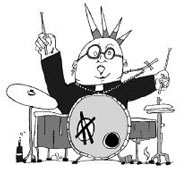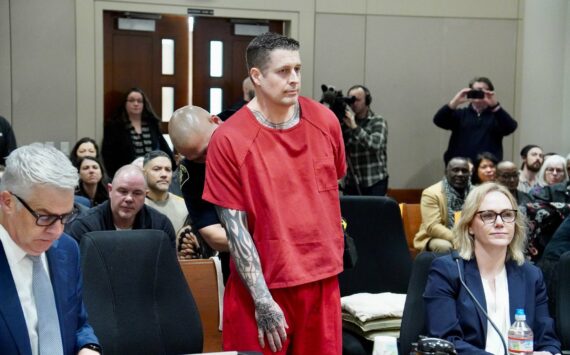THE FIRST CATHOLIC priest I spent a whole lot of time with was Father Mike. Father Mike was the drummer in our punk-rock band. We practiced at his church, in an oversized storage room in the gym next to his rectory in North Houston. Father Mike was a Zappa aficionado who could play hard and fast, which was cool with us. He was also, in his early 30s, hopelessly old—the ancien gris of a mostly underaged band. Father Mike not only offered practice space and mean percussion, but he was a useful presence for getting us gigs in bars.
My next close-up priestly encounter was with Phil Berrigan. You may have heard of him. I can think of no other person in the country who achieved ’60s notoriety for opposing war who continues, four decades later, to not only preach but practice his belief in the sanctity of life. For that entire period (and despite the recent pleadings of people close to him) Phil has continued to divide his time between Jonah House—an inner-city Catholic Worker community in Baltimore that supports itself by painting houses and tending a cemetery and spends the remaining proceeds on feeding and housing the poor—and various federal penitentiaries, where he goes after conspiring with various other Catholic peaceniks to pound on one or another death machine.
Phil is very much an unchanging creature: as devout as he was when he was ordained (the Catholic Church threw him out some time ago due to his, shall we say, lack of deference to ungodly authorities); as committed as ever to his code of pacifism (which includes opposition to abortion) and to social justice; and as prone to arrogance and sexism as a guy brought up in the ’50s can be, despite several decades of cajoling by those around him. I met—encountered—Berrigan after he and three others boarded the U.S.S. Iowa in Norfolk Naval Base, on Easter 1989, to pour blood and pound on a Tomahawk missile. In the aftermath, the Atlantic Life Community, a loose network of East Coast Catholic Worker activists, needed someone to spend six weeks in Norfolk to provide jail support and organizing help, and so I did. In the process, I met local Catholic priests who also quietly did good works for social justice in a fiercely conservative part of the country. They were, and are, heroes.
There have been others. The point is that an enormous institution like the Catholic Church contains an enormous variety of human beings: radicals and liberals and conservatives, old and young, wild and button-down, wise and foolish and both. The news that some numbers of priests—the latest estimate is over 2,000 in the U.S. alone—have been credibly accused of sexual crimes against minors is horrifying; doubly so the frequent reaction of their superiors, which has been to treat these transgressions not as crimes but as PR and personnel problems. These men’s positions rendered their crimes even more serious, and yet their status protected them.
But there is a whole range of people in the priesthood who are not sexual predators—the vast, vast majority—people who, by and large, are just as horrified by these developments as anyone. Perhaps more so, since their own credibility, and the credibility of their work and their faith, is now questioned.
Was Father Mike a pedophile? Did he have an unnatural interest in us? He did, after all, spend an awful lot of time hanging around sweaty teenage boys, even inviting them into his own home. Perhaps. But I really, really doubt it. Years previous, I’d spent time on the street, and I’d been fucked by men who did have an unnatural interest in teenage boys. (For years, portions of the queer community defended this sort of thing, claiming it was an essential way for young queers to be “initiated” and validated in our sexuality.) On the street, they’re called “chicken hawks,” a recognition of both their predatory nature and their basic cowardice in avoiding sexual partners their own age. I know what they smell like (greasy and unbathed, generally, but there’s a vibe, too). And while some are undoubtedly odorless, it’s a much better bet that Father Mike just happened to like playing the same sort of music the rest of us did.
But here I am, nearly two decades later, remembering, wondering, defending what is probably an innocent and good man. Because his superiors didn’t confront this problem long ago, those “probablies” now hang over the entire Catholic Church, and there is no way to erase the doubt.







